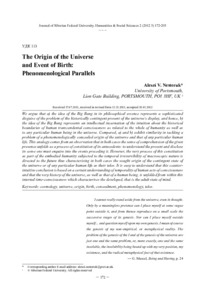Происхождение вселенной и событие рождения: феноменологические параллели
Скачать файл:
URI (для ссылок/цитирований):
https://elib.sfu-kras.ru/handle/2311/2706Автор:
Нестерук, А.В.
Nesteruk, Alexei V.
Дата:
2012-02Аннотация:
We argue that a) the idea of the Big Bang in its philosophical essence represents a sophisticated
disguise of the problem of the historically contingent present of the universes display, and hence, b)
the idea of the Big Bang represents an intellectual incarnation of the intuition about the historical
boundaries of human transcendental consciousness as related to the whole of humanity as well as
to any particular human being in the universe. Compared, a) and b) exhibit similarity in tackling a
problem of a phenomenologically concealed origin of the universe and that of any particular human
life. This analogy comes from an observation that in both cases the sense of comprehension of the given
presence unfolds as a process of constitution of its antecedents: to understand the present and disclose
its sense one must enquire into the events preceding it. However, the very process of this constitution
as part of the embodied humanity subjected to the temporal irreversibility of macroscopic nature is
directed to the future thus characterising in both cases the sought origin of the contingent state of
the universe or of any particular human life as their telos. It is easy to understand that this counterintuitive
conclusion is based on a certain understanding of temporality of human acts of consciousness
and that the very history of the universe, as well as that of a human being, is unfolded from within this
internal time-consciousness which characterises the developed, that is the adult state of mind. В статье проводится феноменологический анализ проблемы происхождения вселенной. Мы
проводим точку зрения, что идея так называемого Большого Взрыва представляет собой
завуалированную проблему случайной фактичности наблюдаемой вселенной. В ней воплощена
интуиция об ограниченности трансцендентального сознания, отнесенного как ко всему
человечеству, так и каждой индивидуальной личности. Представление о Большом Взрыве
аналогично интуиции о сокрытом начале человеческой жизни, которое человек пытается
эксплицировать в процессе своего развития. Тот факт, что как начало вселенной, так и
начало человеческой жизни феноменологически сокрыты от сознания, указывает на то,
что любое вопрошание о них составляет базовую тревогу существования, его «космической
бездомности», которую человечество пытается преодолеть. Интересным является то, что
начало жизни и вселенной эксплицируется посредством движения в будущее, так что и то
и другое становится телосом либо антропологического, либо космологического объяснения.
Этот контринтуитивный результат напрямую обязан феноменологическому исследованию
космологии как представляющей структуру человеческой субъективности.

